HUMAN RESOURCE MANAGEMENT (947326): Psychological Contract Analysis
VerifiedAdded on 2023/01/16
|6
|1332
|68
Report
AI Summary
This report delves into the concept of the psychological contract within Human Resource Management (HRM), defining it as the unwritten expectations between employers and employees, beyond formal job descriptions. It explores how these contracts develop over time and the implications of th...

Psychological Contract
HUMAN RESOURCE
MANAGEMENT – 947326
1
HUMAN RESOURCE
MANAGEMENT – 947326
1
Paraphrase This Document
Need a fresh take? Get an instant paraphrase of this document with our AI Paraphraser
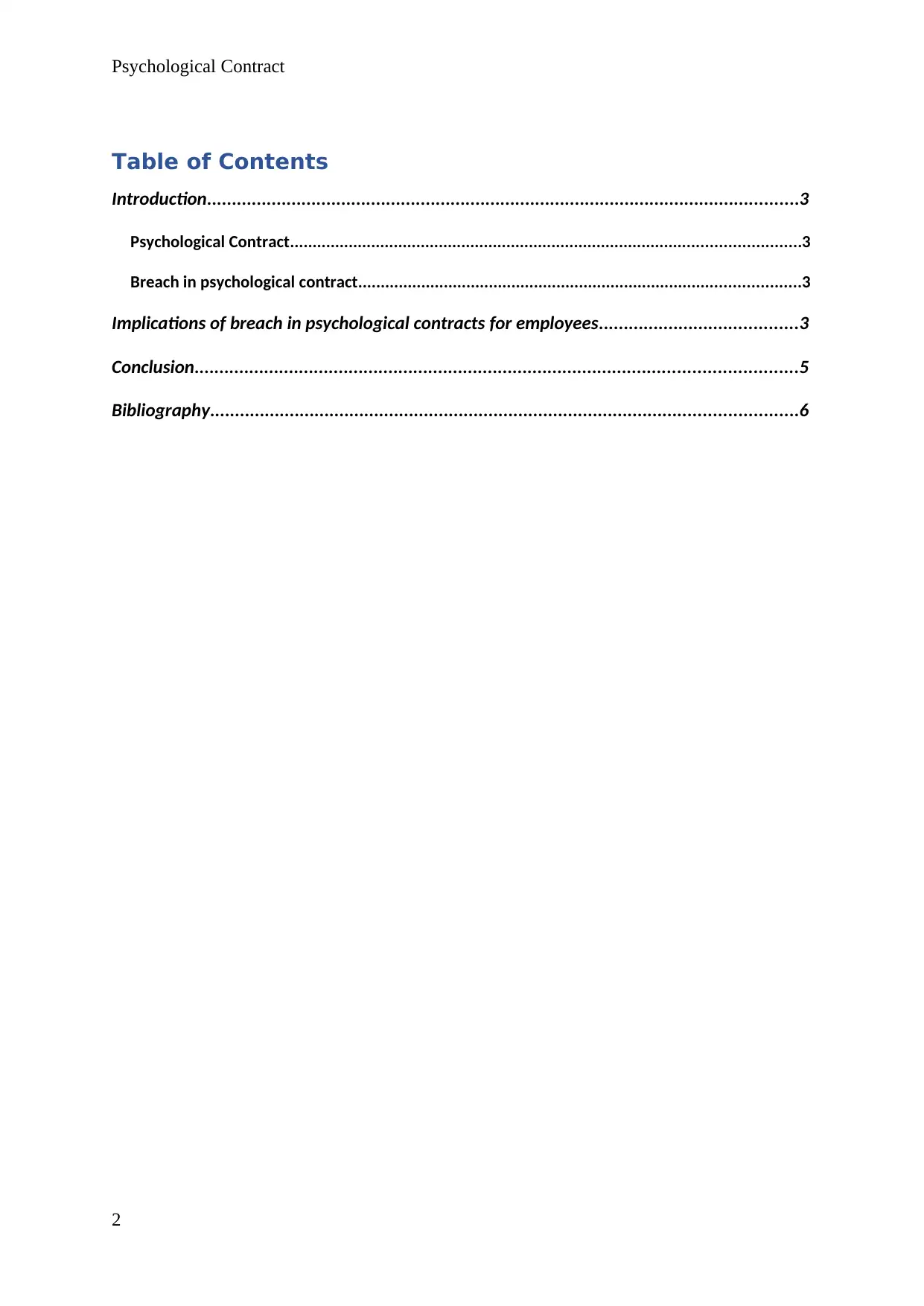
Psychological Contract
Table of Contents
Introduction.......................................................................................................................3
Psychological Contract.................................................................................................................3
Breach in psychological contract..................................................................................................3
Implications of breach in psychological contracts for employees........................................3
Conclusion.........................................................................................................................5
Bibliography......................................................................................................................6
2
Table of Contents
Introduction.......................................................................................................................3
Psychological Contract.................................................................................................................3
Breach in psychological contract..................................................................................................3
Implications of breach in psychological contracts for employees........................................3
Conclusion.........................................................................................................................5
Bibliography......................................................................................................................6
2
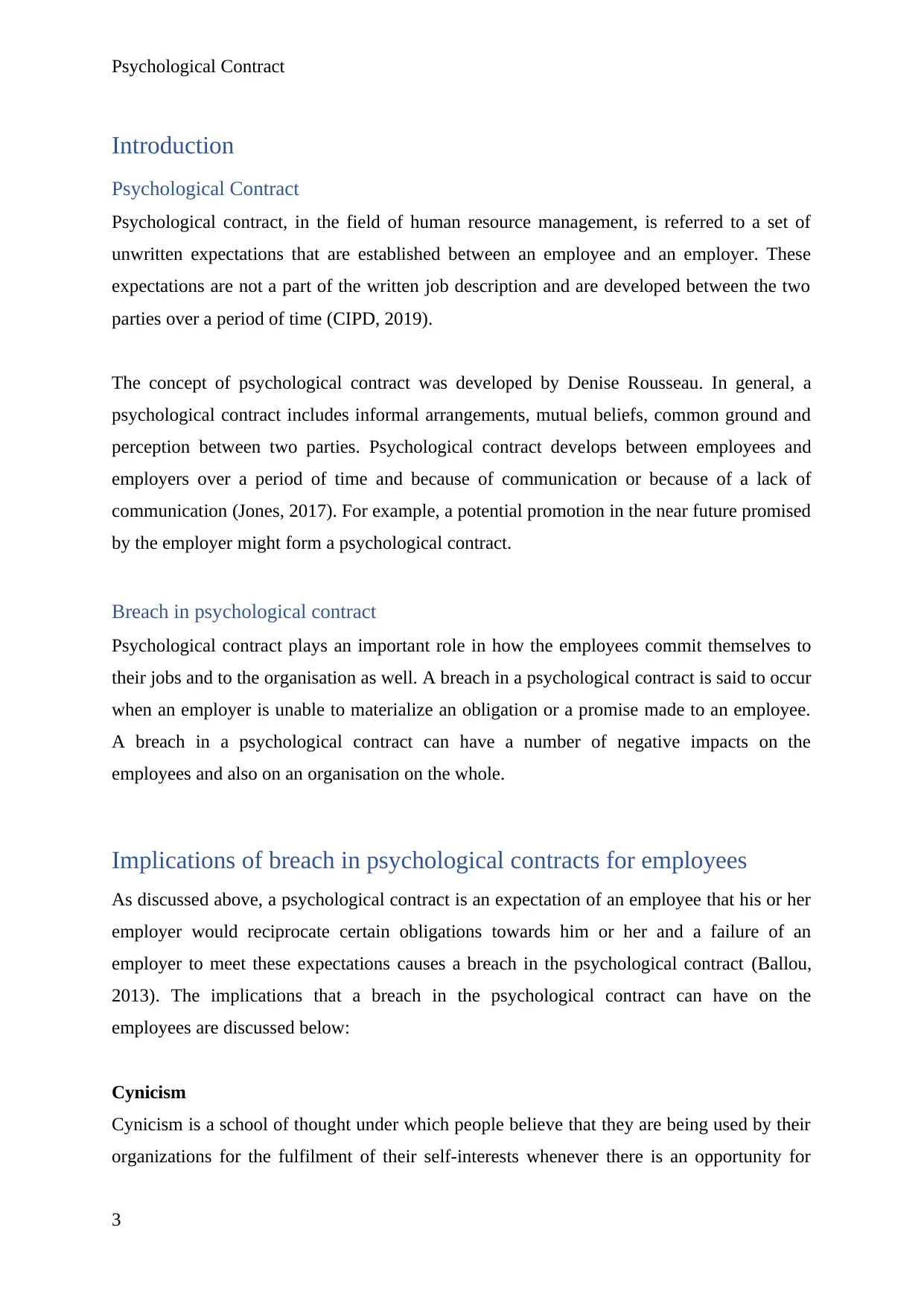
Psychological Contract
Introduction
Psychological Contract
Psychological contract, in the field of human resource management, is referred to a set of
unwritten expectations that are established between an employee and an employer. These
expectations are not a part of the written job description and are developed between the two
parties over a period of time (CIPD, 2019).
The concept of psychological contract was developed by Denise Rousseau. In general, a
psychological contract includes informal arrangements, mutual beliefs, common ground and
perception between two parties. Psychological contract develops between employees and
employers over a period of time and because of communication or because of a lack of
communication (Jones, 2017). For example, a potential promotion in the near future promised
by the employer might form a psychological contract.
Breach in psychological contract
Psychological contract plays an important role in how the employees commit themselves to
their jobs and to the organisation as well. A breach in a psychological contract is said to occur
when an employer is unable to materialize an obligation or a promise made to an employee.
A breach in a psychological contract can have a number of negative impacts on the
employees and also on an organisation on the whole.
Implications of breach in psychological contracts for employees
As discussed above, a psychological contract is an expectation of an employee that his or her
employer would reciprocate certain obligations towards him or her and a failure of an
employer to meet these expectations causes a breach in the psychological contract (Ballou,
2013). The implications that a breach in the psychological contract can have on the
employees are discussed below:
Cynicism
Cynicism is a school of thought under which people believe that they are being used by their
organizations for the fulfilment of their self-interests whenever there is an opportunity for
3
Introduction
Psychological Contract
Psychological contract, in the field of human resource management, is referred to a set of
unwritten expectations that are established between an employee and an employer. These
expectations are not a part of the written job description and are developed between the two
parties over a period of time (CIPD, 2019).
The concept of psychological contract was developed by Denise Rousseau. In general, a
psychological contract includes informal arrangements, mutual beliefs, common ground and
perception between two parties. Psychological contract develops between employees and
employers over a period of time and because of communication or because of a lack of
communication (Jones, 2017). For example, a potential promotion in the near future promised
by the employer might form a psychological contract.
Breach in psychological contract
Psychological contract plays an important role in how the employees commit themselves to
their jobs and to the organisation as well. A breach in a psychological contract is said to occur
when an employer is unable to materialize an obligation or a promise made to an employee.
A breach in a psychological contract can have a number of negative impacts on the
employees and also on an organisation on the whole.
Implications of breach in psychological contracts for employees
As discussed above, a psychological contract is an expectation of an employee that his or her
employer would reciprocate certain obligations towards him or her and a failure of an
employer to meet these expectations causes a breach in the psychological contract (Ballou,
2013). The implications that a breach in the psychological contract can have on the
employees are discussed below:
Cynicism
Cynicism is a school of thought under which people believe that they are being used by their
organizations for the fulfilment of their self-interests whenever there is an opportunity for
3
⊘ This is a preview!⊘
Do you want full access?
Subscribe today to unlock all pages.

Trusted by 1+ million students worldwide
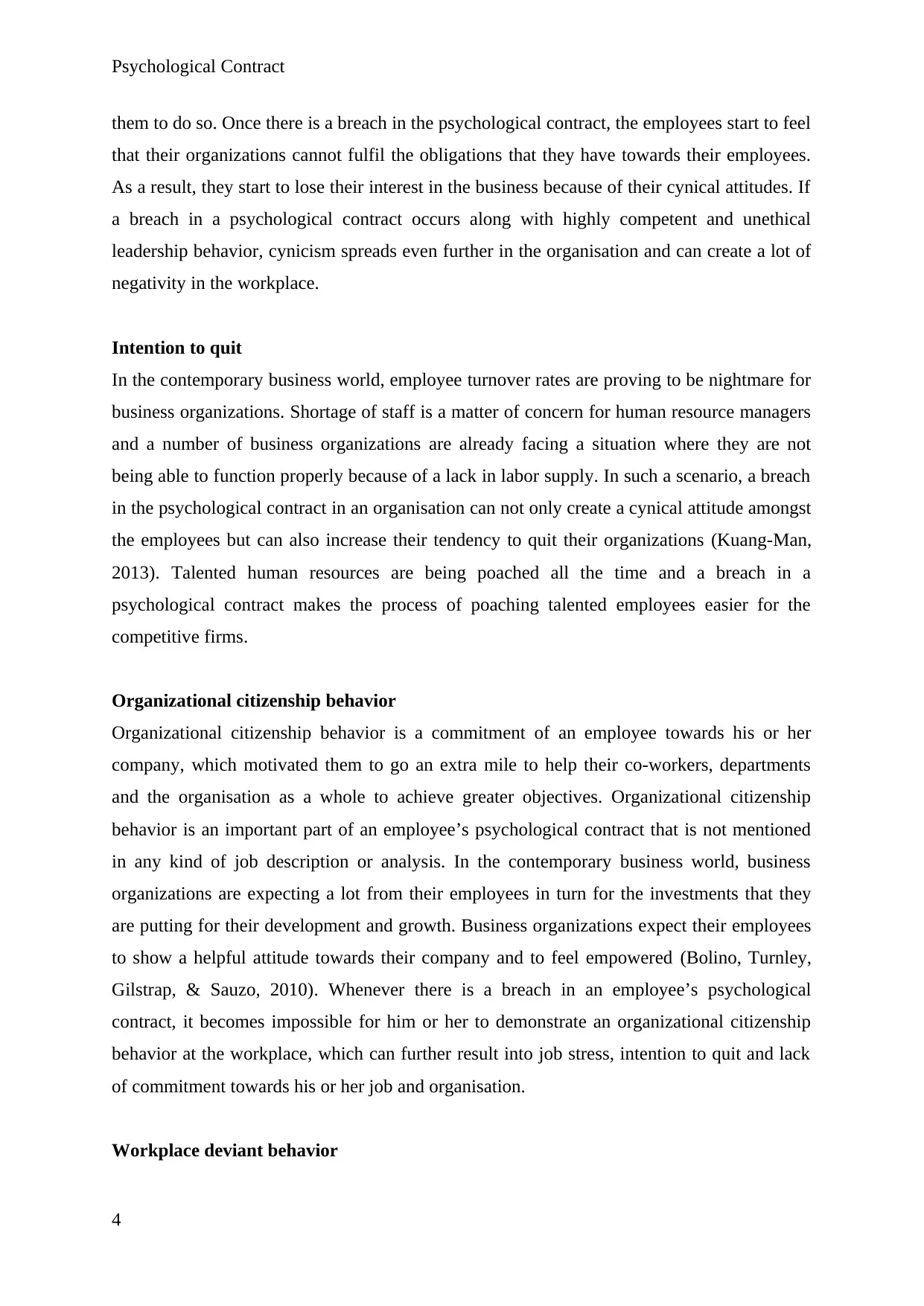
Psychological Contract
them to do so. Once there is a breach in the psychological contract, the employees start to feel
that their organizations cannot fulfil the obligations that they have towards their employees.
As a result, they start to lose their interest in the business because of their cynical attitudes. If
a breach in a psychological contract occurs along with highly competent and unethical
leadership behavior, cynicism spreads even further in the organisation and can create a lot of
negativity in the workplace.
Intention to quit
In the contemporary business world, employee turnover rates are proving to be nightmare for
business organizations. Shortage of staff is a matter of concern for human resource managers
and a number of business organizations are already facing a situation where they are not
being able to function properly because of a lack in labor supply. In such a scenario, a breach
in the psychological contract in an organisation can not only create a cynical attitude amongst
the employees but can also increase their tendency to quit their organizations (Kuang-Man,
2013). Talented human resources are being poached all the time and a breach in a
psychological contract makes the process of poaching talented employees easier for the
competitive firms.
Organizational citizenship behavior
Organizational citizenship behavior is a commitment of an employee towards his or her
company, which motivated them to go an extra mile to help their co-workers, departments
and the organisation as a whole to achieve greater objectives. Organizational citizenship
behavior is an important part of an employee’s psychological contract that is not mentioned
in any kind of job description or analysis. In the contemporary business world, business
organizations are expecting a lot from their employees in turn for the investments that they
are putting for their development and growth. Business organizations expect their employees
to show a helpful attitude towards their company and to feel empowered (Bolino, Turnley,
Gilstrap, & Sauzo, 2010). Whenever there is a breach in an employee’s psychological
contract, it becomes impossible for him or her to demonstrate an organizational citizenship
behavior at the workplace, which can further result into job stress, intention to quit and lack
of commitment towards his or her job and organisation.
Workplace deviant behavior
4
them to do so. Once there is a breach in the psychological contract, the employees start to feel
that their organizations cannot fulfil the obligations that they have towards their employees.
As a result, they start to lose their interest in the business because of their cynical attitudes. If
a breach in a psychological contract occurs along with highly competent and unethical
leadership behavior, cynicism spreads even further in the organisation and can create a lot of
negativity in the workplace.
Intention to quit
In the contemporary business world, employee turnover rates are proving to be nightmare for
business organizations. Shortage of staff is a matter of concern for human resource managers
and a number of business organizations are already facing a situation where they are not
being able to function properly because of a lack in labor supply. In such a scenario, a breach
in the psychological contract in an organisation can not only create a cynical attitude amongst
the employees but can also increase their tendency to quit their organizations (Kuang-Man,
2013). Talented human resources are being poached all the time and a breach in a
psychological contract makes the process of poaching talented employees easier for the
competitive firms.
Organizational citizenship behavior
Organizational citizenship behavior is a commitment of an employee towards his or her
company, which motivated them to go an extra mile to help their co-workers, departments
and the organisation as a whole to achieve greater objectives. Organizational citizenship
behavior is an important part of an employee’s psychological contract that is not mentioned
in any kind of job description or analysis. In the contemporary business world, business
organizations are expecting a lot from their employees in turn for the investments that they
are putting for their development and growth. Business organizations expect their employees
to show a helpful attitude towards their company and to feel empowered (Bolino, Turnley,
Gilstrap, & Sauzo, 2010). Whenever there is a breach in an employee’s psychological
contract, it becomes impossible for him or her to demonstrate an organizational citizenship
behavior at the workplace, which can further result into job stress, intention to quit and lack
of commitment towards his or her job and organisation.
Workplace deviant behavior
4
Paraphrase This Document
Need a fresh take? Get an instant paraphrase of this document with our AI Paraphraser
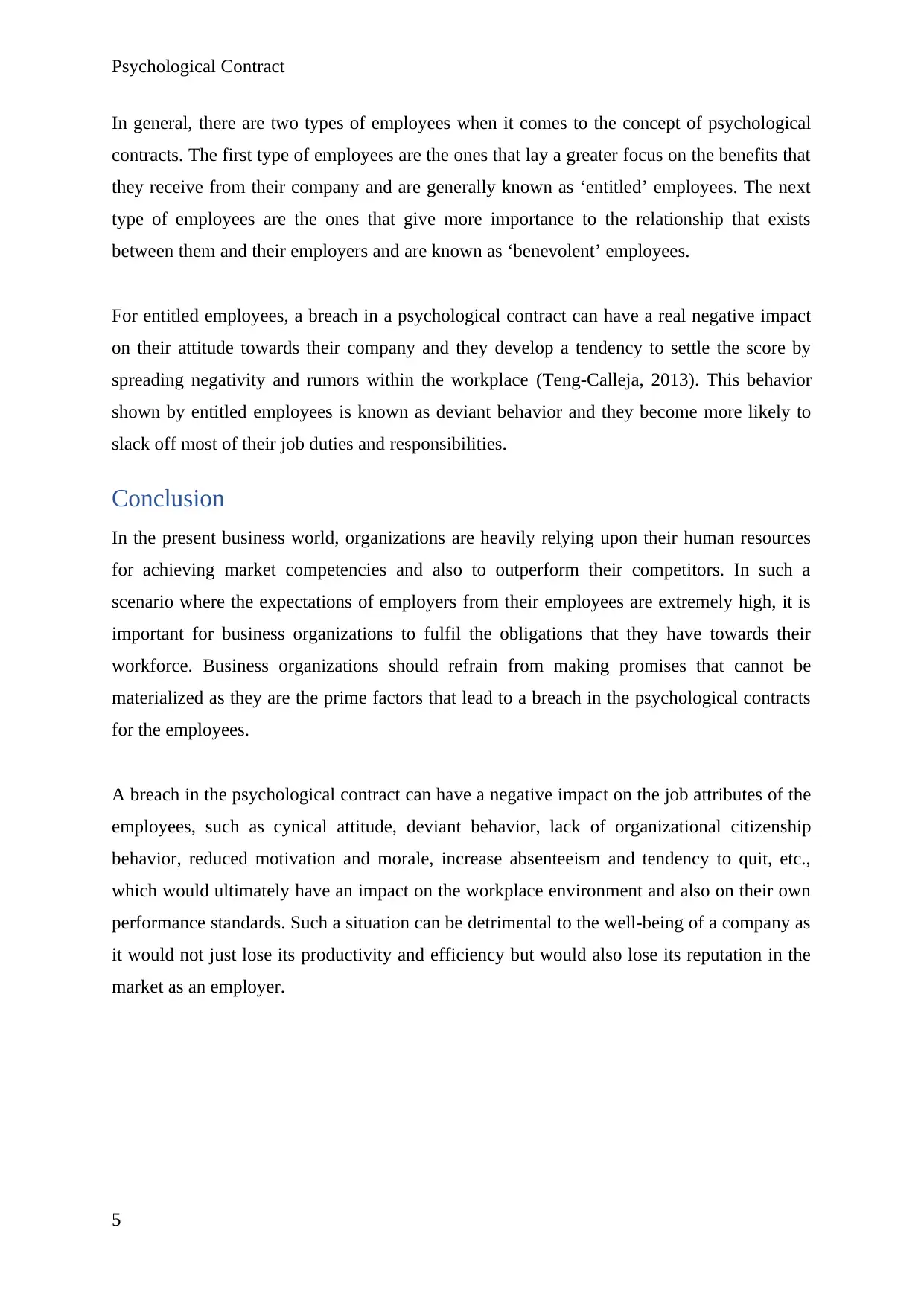
Psychological Contract
In general, there are two types of employees when it comes to the concept of psychological
contracts. The first type of employees are the ones that lay a greater focus on the benefits that
they receive from their company and are generally known as ‘entitled’ employees. The next
type of employees are the ones that give more importance to the relationship that exists
between them and their employers and are known as ‘benevolent’ employees.
For entitled employees, a breach in a psychological contract can have a real negative impact
on their attitude towards their company and they develop a tendency to settle the score by
spreading negativity and rumors within the workplace (Teng-Calleja, 2013). This behavior
shown by entitled employees is known as deviant behavior and they become more likely to
slack off most of their job duties and responsibilities.
Conclusion
In the present business world, organizations are heavily relying upon their human resources
for achieving market competencies and also to outperform their competitors. In such a
scenario where the expectations of employers from their employees are extremely high, it is
important for business organizations to fulfil the obligations that they have towards their
workforce. Business organizations should refrain from making promises that cannot be
materialized as they are the prime factors that lead to a breach in the psychological contracts
for the employees.
A breach in the psychological contract can have a negative impact on the job attributes of the
employees, such as cynical attitude, deviant behavior, lack of organizational citizenship
behavior, reduced motivation and morale, increase absenteeism and tendency to quit, etc.,
which would ultimately have an impact on the workplace environment and also on their own
performance standards. Such a situation can be detrimental to the well-being of a company as
it would not just lose its productivity and efficiency but would also lose its reputation in the
market as an employer.
5
In general, there are two types of employees when it comes to the concept of psychological
contracts. The first type of employees are the ones that lay a greater focus on the benefits that
they receive from their company and are generally known as ‘entitled’ employees. The next
type of employees are the ones that give more importance to the relationship that exists
between them and their employers and are known as ‘benevolent’ employees.
For entitled employees, a breach in a psychological contract can have a real negative impact
on their attitude towards their company and they develop a tendency to settle the score by
spreading negativity and rumors within the workplace (Teng-Calleja, 2013). This behavior
shown by entitled employees is known as deviant behavior and they become more likely to
slack off most of their job duties and responsibilities.
Conclusion
In the present business world, organizations are heavily relying upon their human resources
for achieving market competencies and also to outperform their competitors. In such a
scenario where the expectations of employers from their employees are extremely high, it is
important for business organizations to fulfil the obligations that they have towards their
workforce. Business organizations should refrain from making promises that cannot be
materialized as they are the prime factors that lead to a breach in the psychological contracts
for the employees.
A breach in the psychological contract can have a negative impact on the job attributes of the
employees, such as cynical attitude, deviant behavior, lack of organizational citizenship
behavior, reduced motivation and morale, increase absenteeism and tendency to quit, etc.,
which would ultimately have an impact on the workplace environment and also on their own
performance standards. Such a situation can be detrimental to the well-being of a company as
it would not just lose its productivity and efficiency but would also lose its reputation in the
market as an employer.
5
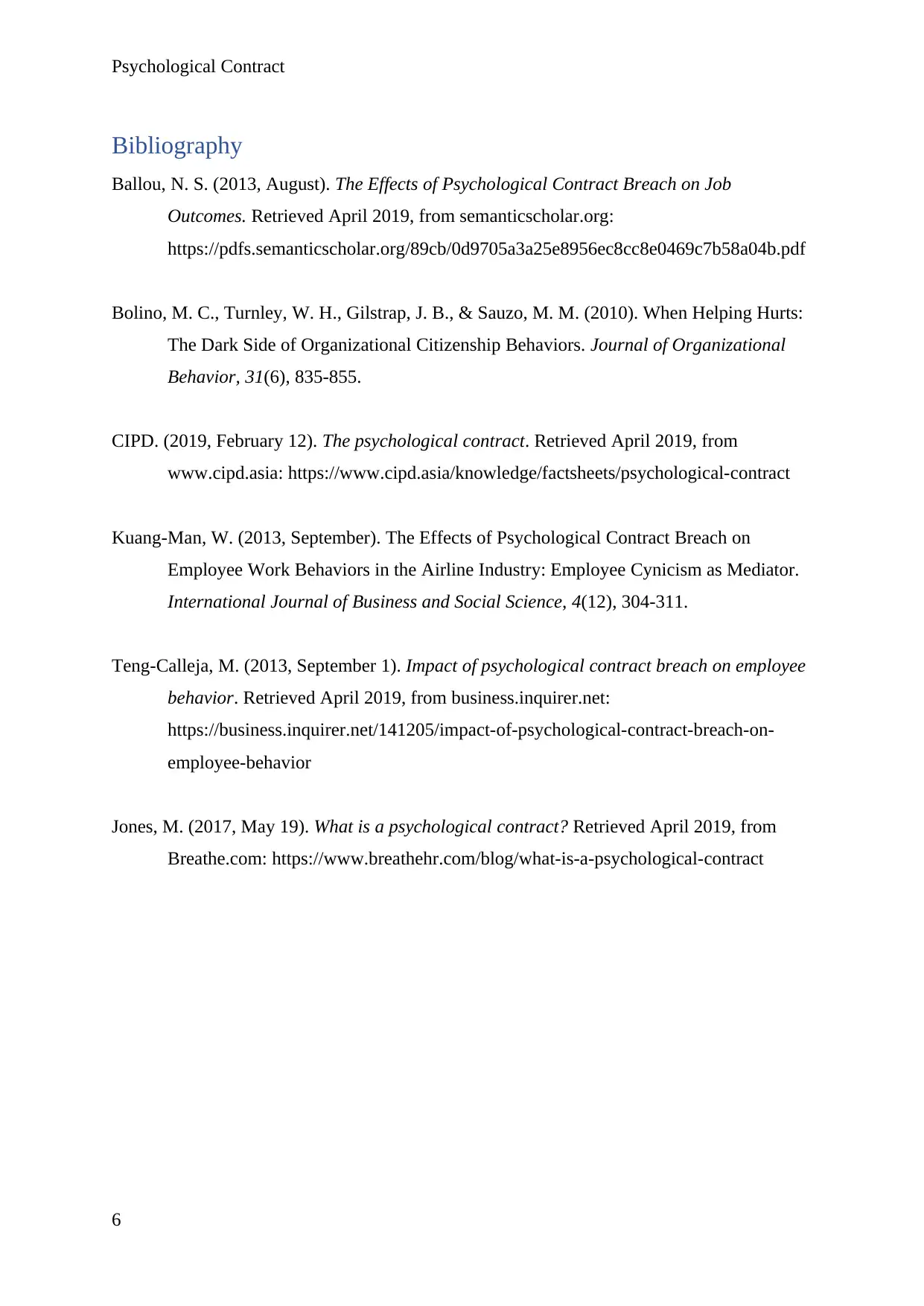
Psychological Contract
Bibliography
Ballou, N. S. (2013, August). The Effects of Psychological Contract Breach on Job
Outcomes. Retrieved April 2019, from semanticscholar.org:
https://pdfs.semanticscholar.org/89cb/0d9705a3a25e8956ec8cc8e0469c7b58a04b.pdf
Bolino, M. C., Turnley, W. H., Gilstrap, J. B., & Sauzo, M. M. (2010). When Helping Hurts:
The Dark Side of Organizational Citizenship Behaviors. Journal of Organizational
Behavior, 31(6), 835-855.
CIPD. (2019, February 12). The psychological contract. Retrieved April 2019, from
www.cipd.asia: https://www.cipd.asia/knowledge/factsheets/psychological-contract
Kuang-Man, W. (2013, September). The Effects of Psychological Contract Breach on
Employee Work Behaviors in the Airline Industry: Employee Cynicism as Mediator.
International Journal of Business and Social Science, 4(12), 304-311.
Teng-Calleja, M. (2013, September 1). Impact of psychological contract breach on employee
behavior. Retrieved April 2019, from business.inquirer.net:
https://business.inquirer.net/141205/impact-of-psychological-contract-breach-on-
employee-behavior
Jones, M. (2017, May 19). What is a psychological contract? Retrieved April 2019, from
Breathe.com: https://www.breathehr.com/blog/what-is-a-psychological-contract
6
Bibliography
Ballou, N. S. (2013, August). The Effects of Psychological Contract Breach on Job
Outcomes. Retrieved April 2019, from semanticscholar.org:
https://pdfs.semanticscholar.org/89cb/0d9705a3a25e8956ec8cc8e0469c7b58a04b.pdf
Bolino, M. C., Turnley, W. H., Gilstrap, J. B., & Sauzo, M. M. (2010). When Helping Hurts:
The Dark Side of Organizational Citizenship Behaviors. Journal of Organizational
Behavior, 31(6), 835-855.
CIPD. (2019, February 12). The psychological contract. Retrieved April 2019, from
www.cipd.asia: https://www.cipd.asia/knowledge/factsheets/psychological-contract
Kuang-Man, W. (2013, September). The Effects of Psychological Contract Breach on
Employee Work Behaviors in the Airline Industry: Employee Cynicism as Mediator.
International Journal of Business and Social Science, 4(12), 304-311.
Teng-Calleja, M. (2013, September 1). Impact of psychological contract breach on employee
behavior. Retrieved April 2019, from business.inquirer.net:
https://business.inquirer.net/141205/impact-of-psychological-contract-breach-on-
employee-behavior
Jones, M. (2017, May 19). What is a psychological contract? Retrieved April 2019, from
Breathe.com: https://www.breathehr.com/blog/what-is-a-psychological-contract
6
⊘ This is a preview!⊘
Do you want full access?
Subscribe today to unlock all pages.

Trusted by 1+ million students worldwide
1 out of 6
Related Documents
Your All-in-One AI-Powered Toolkit for Academic Success.
+13062052269
info@desklib.com
Available 24*7 on WhatsApp / Email
![[object Object]](/_next/static/media/star-bottom.7253800d.svg)
Unlock your academic potential
© 2024 | Zucol Services PVT LTD | All rights reserved.





